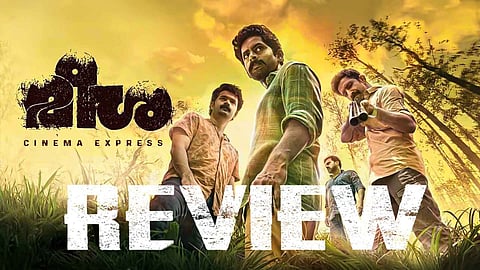Meesha Movie Review: A promising premise undone by cluttered execution
Meesha(2 / 5)
Meesha Movie Review:
Friendship has been a favourite theme for filmmakers, as it offers immense scope for exploring a complete emotional spectrum, ranging from joy and loyalty to betrayal, sacrifice, rivalry, and agony. With Meesha, Emcy Joseph skims through multiple such emotions, but falters while attempting to tie them to a broader socio-political commentary. It has evident shades of films like Kammatipaadam and Madras, but falls short of such standards because of its superficial exploration of complex real-world issues like vote bank politics, caste divide, and other social inequalities.
Director: Emcy Joseph
Cast: Kathir, Hakim Shahjahan, Shine Tom Chacko, Sudhi Koppa, Jeo Baby
Meesha follows a non-linear structure, cutting between the past and present of Midhun (Kathir) and Anandhu (Hakim Shahjahan), two thick friends coming from contrasting social backgrounds. They are involved in local politics, serving their leader, Reghu (Jeo Baby). While Anandhu is the brain, Midhun is the muscle. All of this is not 'shown', but 'said' by other characters. There are at least a couple of action blocks to register Midhun's physical might, but we never get to see why Anandhu is dubbed a 'mastermind'. In fact, he is the last among the two to realise that they are being manipulated as mere pawns in a larger political game.
The film tries to address the casteist notions of the society with an early scene when Anandhu's mother offers tea for Midhun in a separate glass. Despite being aware of the intentions, Midhun doesn't make a deal of it, probably because he's used to it. When Anandhu reacts by having his tea from the same glass, it makes for a warm moment, underlining their friendship. However, the film desperately needed more such moments to make us root for them, rather than making supporting characters sing eulogies on their friendship. Eventually, when the same casteist barriers and the politics around it fracture their bond, we are not moved enough.
Meesha demands strong performers, and Tamil actor Kathir makes a smooth Malayalam debut, without hardly ever looking out of place. He gets the lip-sync spot-on, delivering the lines with the right emotional precision. Hakim's Anandhu is a more complicated character, going through a gamut of emotions, which stems from his insecurities. Living in a minority-dominated area where Midhun is treated as their own, Anandhu often feels isolated, which gradually turns into envy, planting seeds of betrayal, and later guilt. Hakim, who is no stranger to complex roles, is strangely inconsistent here, especially towards the end, when the film depends a lot on his emotional performance.
Despite immense potential in the core Midhun-Anandhu story, Emcy gets ambitious by introducing another set of characters, comprising a hunter named Kitho (Shine Tom Chacko), and three other men. As they set out to hunt and earn some quick money, we see how the dynamics between these men who live by the forest fringes are in contrast to the likes of Midhun and Anandhu. What remains constant is the male ego (or meesha). Emcy, who effectively brought together the two worlds of Soubin and Suraj Venjaramoodu's characters in Vikruthi, attempts something similar in Meesha, but it ends up half-baked.
Meesha's non-linear screenplay structure, besides building intrigue, also offers immense visual possibilities, with the portions in the present set largely within dense forests. When Midhun, a forest officer now, invites Anandhu and their common friend Imod (Sudhi Koppa) over for a night party at his place, Anandhu grows increasingly suspicious, fearing it might be a ploy to settle scores. Betrayal looms large, which is aptly represented by different shades of yellow, a dominant colour throughout the film. Cinematographer Suresh Rajan's frames also extend beyond capturing the aesthetics of the forests to make us feel the danger lurking around. The whole terrain and the atmosphere are unpredictable and constantly changing, akin to the equations between the men in this narrative.
At a time when mainstream films largely celebrate male friendships, it is refreshing to see someone going the extra mile to examine it from a different lens. Yet, it feels like an opportunity lost... in the wild.

